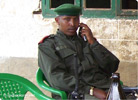
The International Criminal Court recently resumed the trial of Congolese rebel leader Thomas Lubanga Dyilo. The proceedings are the first of their kind and are setting a crucial international precedent. They also highlight the critical and unfortunate irony that, while Lubanga sits in a cell in The Hague, his former comrade, Bosco Ntaganda, is working alongside the Congolese and Rwandan armies and has been spotted lounging on hotel terraces in the town of Goma in plain view of UN staffers and other members of the international community—despite the fact he too is wanted by the ICC for war crimes.
The charges against both Lubanga and Ntaganda stem from their time with the military wing of the then-Ugandan-supported Union Patriots Congolais, a rebel group that terrorized Congo’s Ituri region throughout the beginning of the decade. Lubanga led the UPC and Ntaganda was a close deputy. The two were investigated together by the ICC, which issued arrest warrants for both men on three counts of conscripting children under the age of fifteen—a war crime under the 2002 Rome Statute establishing the ICC.
It is interesting to consider how Lubanga and Ntaganda have met such different fates. Lubanga was arrested in Kinshasa in March 2005 in the wake of his implication in the killing of nine Bangladeshi peacekeepers. (Interestingly, Lubanga spent his first months of “arrest” at one of Kinshasa’s upscale hotels before being moved to a Congolese jail and then, finally, The Hague.) Comparatively, despite the fact that he continued to wreak havoc throughout eastern Congo as the Chief of Staff of recently deposed rebel leader Laurent Nkunda, Ntaganda was a prominent partner in the recently completed joint Rwandan/Congolese operation against the FDLR. Ntaganda eventually ousted Nkunda, mainly because both Kinshasa and Kigali saw Ntaganda as a useful tool for sidelining the politically dangerous and media-savvy Nkunda.
While the international criminal court lacks a police arm, there is growing evidence that even without such an arrest mechanism, there can be real pressure to make an apprehension happen (and not just when it is politically expedient). Writing recently about the Lubanga trial, for example, Ugandan journalist Wairagala Wakabi noted that international pressure is building to arrest Bosco, especially in light of testimony from the Lubanga trial highlighting Bosco’s involvement in atrocities. Now the international community must put pressure on the Congolese government to fulfill its obligations by shipping Bosco to The Hague—even if he is still seen as a useful instrument of war.

